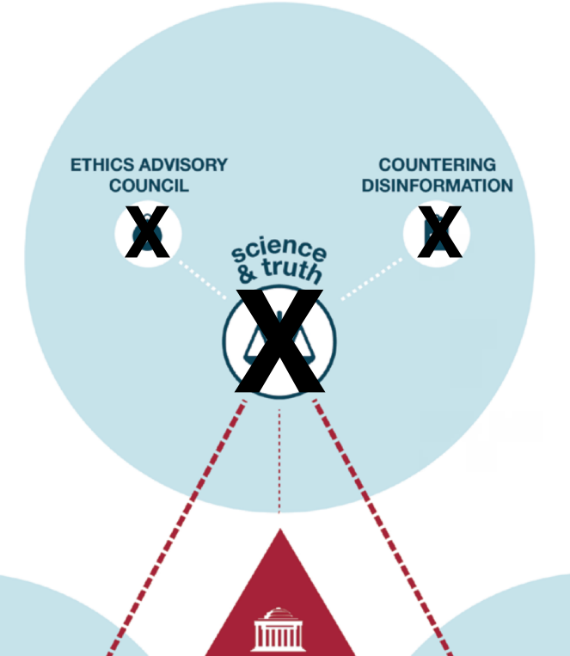
As climate-science graduate students, we know climate change is a serious problem, and that institutions have difficult choices to make in response.
In 2014, MIT's President Rafael Reif and his executive committee approached this problem in a manner thoroughly academic and respectable. In short, they appointed 'The Committee on the MIT Climate Change Conversation' (CCCC) tasked with '[producing] a final report... [listing] key suggestions with associated pros and cons that encompass the range of views of the community.'
Fanfare ensued. There were debates; there were lecturers of esteem and prominence; hors d'oeuvres and refreshments were enjoyed by all. Thousands of community members contributed their perspective on the issue and on what MIT could do about it. The members of the Committee and the wider MIT community handled their responsibility with all the gravitas and urgency of climate change itself. The Committee's report was delivered this June -- thoughtful and packed with well-reasoned proposals on how MIT could respond to this global challenge.
The report seems to have been mostly an academic exercise.
Two weeks ago President Reif announced MIT's 'Climate Change Action Plan.' The plan makes some strong statements regarding the severity of climate change and commits MIT to working towards the goal of limiting warming to 2°C, yet where it is substantial it is vague, and where it is concrete it is insufficient. The stated CO2 emissions reduction target of 32 percent by 2035 is modest, if not embarrassing. The plan 'deplores disinformation' yet proposes nothing to combat it. No mention was made of the Ethics Advisory Board proposed by the CCCC -- an uncontroversial option for countering disinformation and other moral concerns in MIT's investments and partnerships. Divestment is not discussed beyond a palliative nod to the student divestment organization 'Fossil Free MIT' (and the 3500+ MIT community members who signed their petition) for pressuring the President's office to start the Conversation. Beyond a reshuffling of resources, the largest action proposed by MIT involves a "strategy of engagement with industry."
Now, in a climate change action plan, one would expect a series of steps that had a feasible chance of achieving the stated goals. Instead, MIT's plan is to work more closely with industry, fondly including coal, tar sands, and Arctic drilling companies. Meanwhile, ExxonMobil, one of the founding members of the MIT Energy Initiative, is currently under federal investigation for actively misleading the public about the science of climate change. The plan's focus on generating new solutions distracts from the reality: the main obstacle to enacting the existing, viable, political and technological solutions is the very industry with which MIT intends to partner.
It is undeniable that a future that limits warming to 2°C is incompatible with a thriving fossil fuel industry, given that 80 percent of the industry's current reserves must stay in the ground in order to meet that target. If MIT itself is unwilling to take a decisive stance on a future less reliant on fossil fuels, how does it expect to work with industry partners to address climate change? Instead of taking meaningful steps, the plan grants social license to the fossil fuel industry to keep drilling and burning, wheeling and dealing.
Over the last few decades, the fossil fuel lobby has narrowed the scope of conversation around climate change: it's unrealistic to substantially cut emissions, more research is needed, and individuals shall do their part by planting trees, changing light bulbs, and driving hybrids. The modest actions proposed by MIT's climate plan fit nicely into these conversation parameters, which have so far failed to generate substantive action. Is it possible for MIT to maintain its warm embrace with industry without embracing industry's narrow concept of possible solutions?
As a preeminent global institution of scientific and technical research and teaching, MIT should be able to take the lead in risking short-term benefits in favor of a more stable future for the students it educates. MIT invested great resources and hope into the CCCC; the effective abandonment of its report represents a breakdown of the institutional process. Rather than assuming this recent shift was driven by pressure from big donors behind closed doors, we ask that MIT be transparent and justify the decision to leave many clear, feasible, and meaningful suggestions untouched.
We applaud the President for acknowledging in writing the severity of climate change. In 2015, however, retaining the status quo with one's actions is a political decision, one that leaves both our science and planet under attack.

Adapted from the cover page of the MIT Climate Change Conversation Committee's (CCCC) report. The CCCC created this image to summarize their recommendations. The authors of this article altered the image, crossing out the three elements of the 'science and truth' section that were neither adopted nor addressed by the MIT administration.
The authors are graduate students of the Program in Atmospheres, Oceans, and Climate at MIT. They spend too much time discussing the failures of too many institutions over too much coffee.